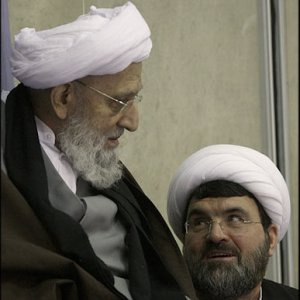Once a Chieftain

“Tell the seniors that the age of good offices is over,” said a principlist member of Majles, Parliament, in 2003, pointing indirectly to Mahdavi Kani. Did the Ayatollah not get the drift –that the heyday of senior revolutionary clerics was coming to an end?
Mohammad Reza Mahdavi Kani was born in 1931 in Kan, a village on the outskirts of Tehran. As a young cleric, Mahdavi Kani was one of the passionate supporters of Ayatollah Khomeini, who started his battle against the regime of Mohammad Reza Pahlavi—the last Shah of Iran—in 1963. Mahdavi Kani’s devotion to the cause of an Islamic regime resulted in his exile to Kurdistan Province, in 1974.
After the victory of the Islamic Revolution in 1979, Mahdavi Kani held several high-ranking positions in the new regime. A member of the Council of Islamic Revolution, member of the Council of Guardians, Interior Minister, Interim Prime Minister –as a result of a bomb blast that killed both President Raja’ei and Prime Minister Bahonar- and later, a member of the Council of Expediency Discernment. Along with several well-known revolutionary clerics, he co-established the Association of Combatant Clerics, a key political coterie in the pre-Khatami era of Iranian politics. He has chaire Imam Sadegh University, a higher education institution that -based on an unwritten agenda- trains future executives of the Islamic Republic. Imam Sadegh students are in fact a product of Mahdavi Kani’s strategic depth.
After his short-lived premiership, Mahdavi Kani abandoned the position, which was filled by a young Mir Hossein Mousavi. The mid-1980s were a time when following the relative political stability that resulted from the early crackdown on anti-revolution forces (Marxists and Monarchists), the rift between forces loyal to Ayatollah Khomeini –the left/right dichotomy of the future- gradually opened up. On the brink of the third parliamentary elections, the left wing of the Association of Combatant Clerics –which included such luminaries as Mehdi Karroubi and Mohammad Khatami- split off to establish a new clerical political entity – the Assembly of Combatant Clerics. Compared with the socialist-imbued leftists of those years (who later turned into liberal reformists), Mahdavi Kani and his conservative coterie were against the excessive intervention of government in economic affairs (for years, the left disparagingly labeled the right as ‘the Bazaar wing’ and Mousavi had once called the Bazaar merchants ‘leeches’).
When mid-1990s approached, the right -now distancing itself from the pragmatist Hashemi Rafsanjani- was gearing up to extend its domination over the executive branch of government. (The judiciary and Parliament were already under its control.) Nevertheless, as election day for the presidency approached, it became more and more apparent that reform candidate Khatami would not be a mere benchwarmer. Khatami’s spiraling popularity among voters compelled Mahdavi Kani to mount the political stage and push back strongly against the reformist campaign. He compared Khatami to the first post-Revolution President, Abol-Hassan Bani Sadr –and how he fled the country after being dismissed by the parliament– warning that history could repeat itself: like the post-Constitutional Revolution era where clerics were marginalized, and another dictator like Reza Shah Pahlavi could seize power. Mahdavi Kani’s remarks received a heavy-handed response from his counterpart in the Assembly of Militant Clerics, Mehdi Karroubi, who reminded Mahdavi Kani that he himself served as Bani Sadr’s interior minister. The threat of a Khatami presidency prompted Mahdavi Kani to tour various cities, where he gave speeches in support of Khatami’s rival, Ali Akbar Nategh-Nouri, and as his Parthian shot, Mahdavi Kani implicitly referred to the Supreme Leader’s preference for a Nategh Nouri’s presidency, but all to no avail.
Mahdavi Kani endeavored to secure another right-wing politician (known as principlists since the early 2000s) the presidency in 2005. On the verge of the ninth presidential election in 2005, along with Nategh-Nouri he tried to gather the principlists under one umbrella to endorse a single candidate for president. The diversity and the strong political ambitions of principlist candidates –from Ahmadinejad and Qalibaf to Rezai and Larijani- thwarted his efforts to form a united conservative front. “A loss will come upon them if they don’t listen to the advice of the seniors,” Mahdavi Kani was quoted as saying then.
Regardless, from the ballot boxes emerged a winning candidate then known as a principlist– Mahmoud Ahmadinejad. The new president, however, quickly proved to be from quite a different ilk, something perhaps unprecedented in post-revolution Iranian history. The ‘third way’ represented by Ahmadinejad, which although it shared some of the philosophy of the principlists, favored a different, at times radical approach to statecraft and was less concerned with the usual cultural concerns of the principlist camp.

